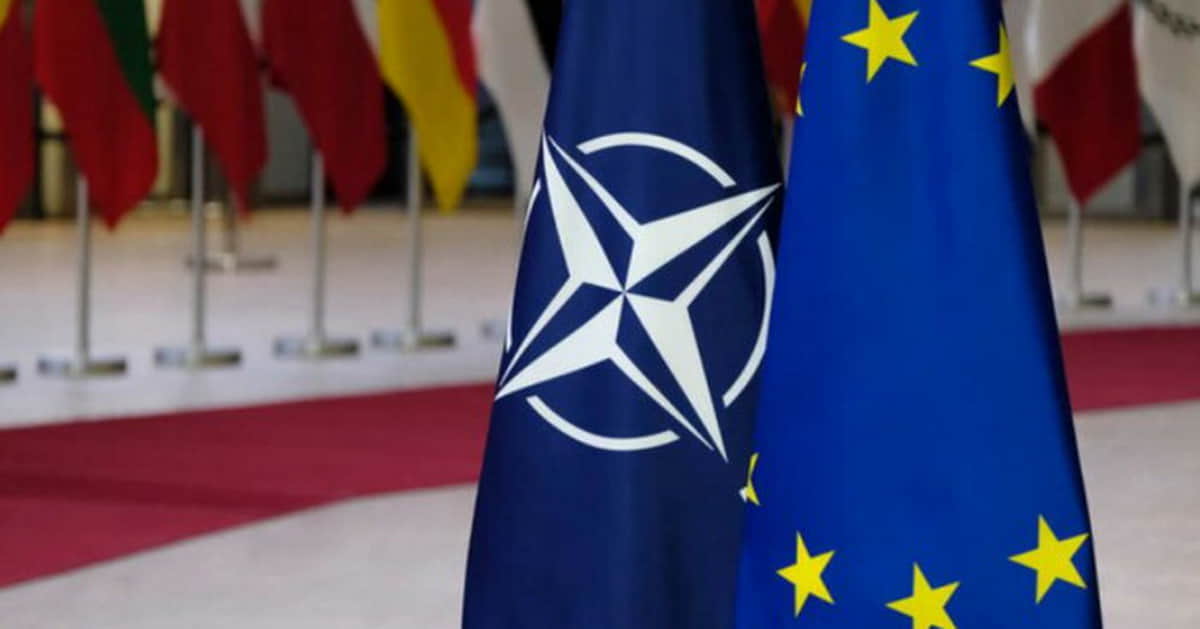Who Ukrainians trust in the West and how they view EU and NATO

A mix of disappointment and optimism. A stronger belief in themselves than in their partners. These are likely the two key impressions from a new survey on Ukrainian attitudes conducted in November by the New Europe Center.
Ukrainians overall remain optimistic about their trajectory toward the West. Ukrainians support the country's NATO accession. Many respondents also believe Ukraine can join the EU in the next five years.
Read more about Ukrainians' sentiments in the New Europe Center's article - Disappointment in allies and hope in Trump: how Ukrainian sentiments have changed over the year. Advertisement: Surveyed Ukrainians see two primary security guarantees for the country in nearly equal measure: developing nuclear weapons (31.3%) and gradual NATO membership (29.3%).
A significant majority, 70.3%, support Ukraine's gradual accession to NATO under the condition that the Alliance invites Ukraine within internationally recognised borders (with Article 5 of the Washington Treaty applying to the entire state, excluding temporarily occupied territories). This idea is called the West German model: the Federal Republic of Germany (West Germany) became a NATO member in 1955, but the German Democratic Republic (East Germany), behind the so-called Iron Curtain, joined almost 40 years later, after the country's reunification. The New Europe Center noted that a significant difference from Germany's case in the idea of gradual accession for Ukraine is that the invitation should immediately cover the entire territory of the country within internationally recognised borders.
Over a third of Ukrainians (34%) believe Ukraine will join the EU within the next five years. Similarly optimistic timelines are often cited by Ukrainian authorities. The relative dispersion of opinions on the timeline for EU accession reflects a "maturation" among Ukrainians, who increasingly understand the complexities of joining the EU. At the same time, 63% of Ukrainians believe that external pressure from the EU and the US is necessary to combat corruption.
A majority (57.2%) feel that Ukraine's partners are not doing enough to ensure Ukraine's victory. It is uncertain how long and to what extent the West can continue supporting Ukraine. Efforts by some Western politicians to negotiate with Putin, potentially at the expense of Kyiv, are becoming more apparent.
This anticipation of unfavourable developments influences Ukrainian assessments and attitudes. This is especially evident in responses to a question about trust in foreign leaders. The leaders of public trust among Ukrainians are European Commission President Ursula von der Leyen and Polish President Andrzej Duda, 65% each.
In third place is Canadian Prime Minister Justin Trudeau (nearly 60%), and in fourth place is French President Emmanuel Macron (58.4%). At the same time, there has been a notable decline in overall trust toward foreign leaders. Macron was the only Western leader with an increase in trust in 2024: last year, he was trusted by 54.5% of Ukrainians, and this year by 58.4%.
Over 44% of Ukrainians say that they trust US President-elect Donald Trump, which is significantly more than in all European countries. For example, in France, Trump was trusted by 16%, in the UK by 30%, and only Hungary displayed similar favorability at 37%, still lower than the level among Ukrainians. Despite some responses indicating disappointment in Western actions, Ukrainians continue to demonstrate high levels of trust in Western institutions: the EU (69.2%), NATO (64.4%), and the G7 (62.4%).
In contrast, low public trust in the UN (37.9%) and the OSCE (34.6%) is unsurprising.
If you notice an error, select the required text and press Ctrl + Enter to report it to the editors.